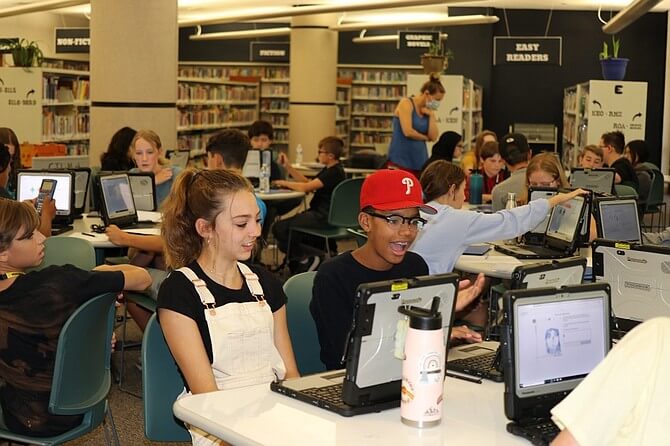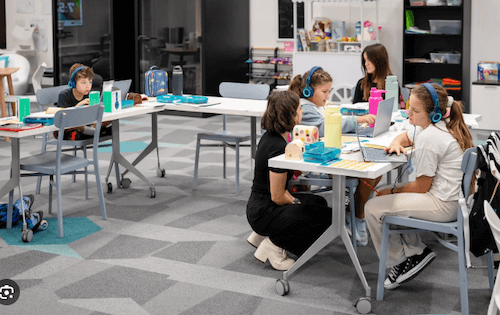As a parent, you are constantly looking for ways to give your child a competitive edge—to unlock their potential and pave a clear path toward a top-tier education and a successful career. While traditional academics are foundational, the world's most innovative companies and elite university admissions boards are increasingly looking for something more.
This is where the work of Stanford psychologist Dr. Carol S. Dweck, a leading expert on motivation and success, becomes essential. Dr. Dweck's research demonstrates that the key to achievement lies in fostering a "growth mindset," the belief that abilities can be developed through dedication and hard work. As she puts it, the focus should be on praising the process:
"Praising children’s intelligence or talent…sends a fixed-mindset message. It tells them that this is what we value...and that they shouldn’t risk making mistakes."
Healthy competitions provide the perfect arena to apply this principle, teaching kids to embrace challenges, learn from setbacks, and understand that effort, not innate talent, is the true engine of innovation. This mindset, forged in the challenging arena of competition, is what prepares them for success long before they step onto a college campus.
To help build your child's motivation and skills, explore this list of premier competitions in robotics, STEM, math, and tech.
1. Science Competitions
The Fairchild Challenge
- Grade Level: Pre-K–12.
- Format: Offline.
- Description: An environmental education program encouraging students to engage in research and projects related to the natural world.
- Typical Schedule: Challenges are issued throughout the academic year; specific dates vary by location.
- Participation: Over 125,000 students from 272 schools participated in a recent year.
- Prizes: Recognition awards and certificates; top schools may receive special honors.
- Website
fairchildchallenge.org
Elementary Science Olympiad (ESO)
- Grade Level: K–6.
- Format: Offline.
- Description: Hands-on, inquiry-based activities challenging students to build their understanding of basic scientific concepts.
- Typical Schedule: Events are organized at local and regional levels; dates vary by location.
- Participation: Thousands of students across the U.S. engage in ESO activities annually.
- Prizes: Medals, trophies, and certificates recognizing achievement in various events.
- Website:
soinc.org
2. Art and Writing Competitions
K-12 Coastal Art & Poetry Contest
Grade Level:K–12.- Format: Offline.
- Description: Encourages students to explore coastal and marine environments through art and poetry.
- Typical Schedule: Annual contest with submissions typically due in January.
- Participation: Open to California residents; hundreds of entries received each year.
- Prizes: Winners receive gift certificates and have their work featured online and in exhibits.
- Website: coastal.ca.gov
Celebrating Art Contest
- Grade Level: K–12.
- Format: Online.
- Description: A platform for young artists to showcase their work and become published artists.
- Typical Schedule: Contests held three times a year; deadlines in April, August, and December.
- Participation: Thousands of entries from across the U.S.
- Prizes: Top entries win art supplies and cash awards; selected artworks are published in a hardcover book.
- Website: celebratingart.com
3. General Knowledge Competitions
National History Bee and Bowl
- Grade Level: Elementary and up.
- Format: Offline.
- Description: A history quiz competition testing students' knowledge of historical facts and events.
- Typical Schedule: Regional competitions held throughout the academic year; National Championships in the spring.
- Participation: Thousands of students from various schools compete annually.
- Prizes: Trophies, medals, and recognition; top teams may qualify for international competitions.
- Website: historybee.com
National Geographic GeoBee
- Grade Level: 4–8.
- Format: Offline.
- Description: A geography competition testing students' knowledge of the world.
- Typical Schedule: School-level bees held in the fall; state and national competitions in the spring.
- Participation: Over 2 million students participate annually.
- Prizes: Scholarships, medals, and global recognition for top performers.
- Website: natgeobee.org
4. Robotics and STEM Competitions
FIRST® LEGO® League (FLL)
- Grade Level: 4–16 (Explore for K–4, Challenge for 9–16).
- Format: Offline.
- Description: Students build and program LEGO robots to solve real-world problems.
- Typical Schedule: Regional events from November–February; World Festival in April.
- Participation: Over 300,000 students globally.
- Prizes: Awards for participation, innovation, and teamwork.
- Website: firstinspires.org
NSF Game Maker Awards Competition
- Grade Level: K–12.
- Format: Online.
- Description: Students imagine life in the year 2100 and design games showcasing the role of science and technology.
- Typical Schedule: Annual competition; deadlines vary.
- Participation: Open to U.S. students.
- Prizes: Cash awards and recognition.
- Website: nsf.gov
NSBE Jr. Explorer Technical Innovation Competition
- Grade Level: Middle and high school.
- Format: Offline.
- Description: Students research and present science projects at the NSBE Annual Convention.
- Typical Schedule: Annual competition; deadlines vary.
- Participation: Open to NSBE Jr. members.
- Prizes: Awards and recognition.
- Website: nsbe.org
Air Force Association (AFA) CyberPatriot Competition
- Grade Level: Middle and high school.
- Format: Online.
- Description: Students tackle cybersecurity issues by securing virtual networks.
- Typical Schedule: Regional and national rounds throughout the academic year.
- Participation: Thousands of students globally.
- Prizes: Scholarships, trophies, and recognition.
- Website: uscyberpatriot.org
The Centre for Education in Mathematics and Computing (CEMC)
- Grade Level: 5–12.
- Format: Online/Offline.
- Description: Math and computer science contests emphasizing logical reasoning and problem-solving.
- Typical Schedule: Contests held throughout the year.
- Participation: Thousands of students globally.
- Prizes: Certificates and recognition.
- Website: cemc.uwaterloo.ca
U.S.A. Mathematical Talent Search (USAMTS)
- Grade Level: Middle and high school.
- Format: Online.
- Description: A math competition with challenging problems requiring written justification.
- Typical Schedule: Students get a month to solve each problem set.
- Participation: Open to U.S. students.
- Prizes: Certificates and recognition.
- Website: usamts.org
FIRST® Tech Challenge (FTC)
- Grade Level: 7–12.
- Format: Offline.
- Description: Teams build and program robots to compete against other teams.
- Typical Schedule: Regional and national events throughout the academic year.
- Participation: Thousands of students globally.
- Prizes: Trophies, scholarships, and recognition.
- Website: firstinspires.org
National Stem League (NSL)
- Grade Level: Middle and high school.
- Format: Online/Offline.
- Description: Teams compete in race engineering, coding, and automation challenges.
- Typical Schedule: Annual competition; deadlines vary.
- Participation: Thousands of students globally.
- Prizes: Awards and recognition.
- Website: nationalstemleague.org
Perennial Math Tournaments
- Grade Level: 3–12.
- Format: Online/Offline.
- Description: Math competitions with creative problem-solving challenges.
- Typical Schedule: Multiple contests throughout the year.
- Participation: Thousands of students globally.
- Prizes: Medals, certificates, and recognition.
- Website: perennialmath.com
Rocket City Math League (RCML)
- Grade Level: Middle school, high school, and two-year college students.
- Format: Online.
- Description: A free math competition with three 30-minute tests per level.
- Typical Schedule: Contests held throughout the academic year.
- Participation: Open to students globally.
- Prizes: Certificates and recognition.
- Website: rocketcitymath.org
Purple Comet! Math Meet
- Grade Level: Middle and high school.
- Format: Online.
- Description: A team-based math competition with timed problem-solving.
- Typical Schedule: Annual contest in April–May.
- Participation: Thousands of students globally.
- Prizes: Certificates and recognition.
- Website: purplecomet.org
ArcGIS StoryMaps Competition
- Grade Level: Open to all ages.
- Format: Online.
- Description: Students create stories using data visualization techniques to communicate ideas or solutions.
- Typical Schedule: Annual competition; opens in September.
- Participation: Open to students globally.
- Prizes: Recognition and awards.
- Website: arcgis.com
NASA Competitions
- NASA STEM Challenges: Various competitions for K–12 students, including robotics, coding, and science challenges.
- Website: nasa.gov
As a Child Development Specialist, I focus on the science of early brain growth. That lens now shapes my work exploring how AI — when used with thoughtful parental guidance — can support, or sometimes disrupt, healthy development. By staying close to both the research and the technology, I help parents make informed, intentional choices for their children.



.svg)





















